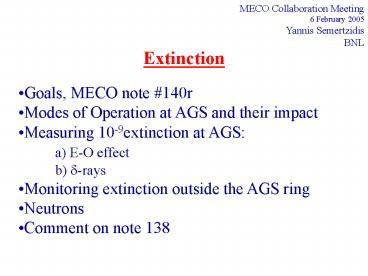Extinction
1 / 20
Title: Extinction
1
Extinction
MECO Collaboration Meeting 6 February
2005 Yannis Semertzidis BNL
- Goals, MECO note 140r
- Modes of Operation at AGS and their impact
- Measuring 10-9extinction at AGS
- a) E-O effect
- b) ?-rays
- Monitoring extinction outside the AGS ring
- Neutrons
- Comment on note 138
2
Extinction Related Backgrounds
3
General Extinction Plan
- Minimize Extinction at the AGS
- 1) Optimize operation mode (1 or 2 bunches,
etc.) - 2) Monitor it at AGS
- Enhance it (Insurance Policy) and Monitor it at
Extraction
4
MECO beam structure
MECO experiment
5
What is Planned for the AGS Ring
Mike Brennan (1998)
- Use a 60KHz AC Dipole Magnet (CW). Resonance at
the vertical betatron frequency - Use a pulsed Strip-line kicker to kick the full
buckets into stable orbits. - Need 1-50ms to drive particles off (driven by the
strip-line kicker)
6
Required Extinction vs Time (MECO note 140r by
BM, YS)
7
Buckets at AGS with h6, W. Glenn
Buckets are connected creating unstable fixed
points to which our planned (RFFM- sinewave)
monitor is not sensitive.
8
One or Two filled buckets? (W.Glenn)
- At Injection the proton phase space is large
(scales as 1/??). While waiting for the second
injection (0.2s) protons hop into the next
buckets
9
Preventing Bucket Contamination
Coasting bucket
Accelerated bucket
10
Possible Scrubbing
- Construct a square pulse (occasional) monitor at
extraction - Will do the job (scan through the interesting
region), no danger to the calo detector. - Cheap
- If we do find out that we need the extra
extinction we can then build the external RFMM.
11
E-O Measurement of Extinction at AGS
- In AGS ring with two filled buckets
- At extraction
100MP in each filled bucket (FB)
lt0.1P in each empty bucket (EB)
12
- The electric field due to the beam at 1cm away,
assuming the beam size lt 1cm - For filled buckets Q20TP, L?100ns?c30m
13
Electro-optic Effect
Pol.
- The laser light acquires an ellipticity
14
Dielectric constant e?25
For 10-9extinction and 100ns?1.3?s
With 400,000 passes/AGS cycle in 0.5s
15
Proposal to use Fabry-Perot
- resonator with 1000 reflections, 1cm long
(corresponding to 10m, less than the 30m of the
beam base length)
Protons
Analyzer
QWP
Laser
Photodiode, Amplifier
E-O Crystal, Fabry-Perot resonator
16
Dynamic range
- Main signal 35rad! (filled bucket)
- Extinction 35nrad (empty buckets),
- i.e. dynamic range of 3?107
- The best way to achieve the dynamic range is to
use a light switch after the analyzer to gain
three to four orders of magnitude.
17
Using delta-rays with gas jet at AGS
With a gas jet of 10-7 Torr equivalent we will
get 10 electrons With 10MeV energy per AGS cycle
for 10-9 extinction. In 5 minutes there are 30
electrons with 100MeV energy.
18
Neutron Background
- In g-2 (15m diameter ring) we injected 108
pions in a pulse of 50ns, similar in number and
time as our MECO proton pulses only 1.35?s apart.
The near calorimeters were gated back on
125?s after injection! Electron energy threshold
1GeV.
The far calorimeters were gated back on 75?s
after injection!
Neutron simulation needed for all extinction
monitors.
19
Comment on MECO note 138
- Arlene Zhang They found no error on the
calculations. - They claim the power requirement for the sinewave
RFMM to be large with cost implications. - I suggest we ask Arlene to give a presentation at
the next MECO collaboration meeting at BNL.
20
Summary
- Extinction vs time between pulses
- AGS mode of operation (1 vs 2 filled
buckets-W.Glenn) - Two methods of measuring 10-9 extinction at AGS
(E-O and delta rays) - Neutron background!
- Limitations of the sinewave RFMM
- Square wave sampling kicker-possibility of
scrubbing - Need a presentation on MECO note 138































